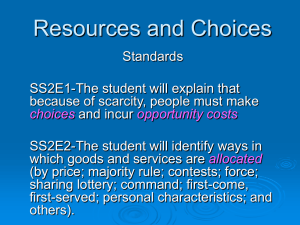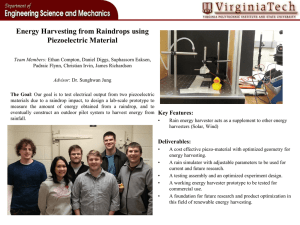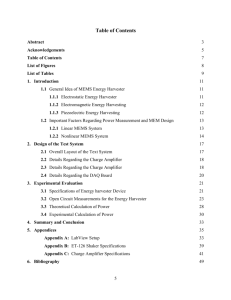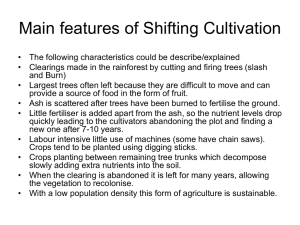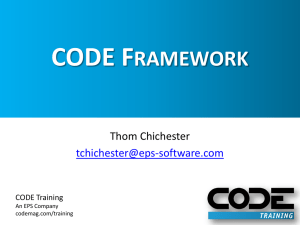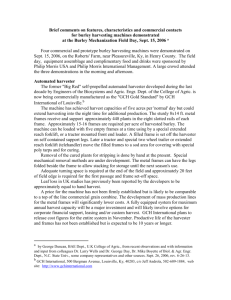Energy Performance Systems, Inc.
advertisement
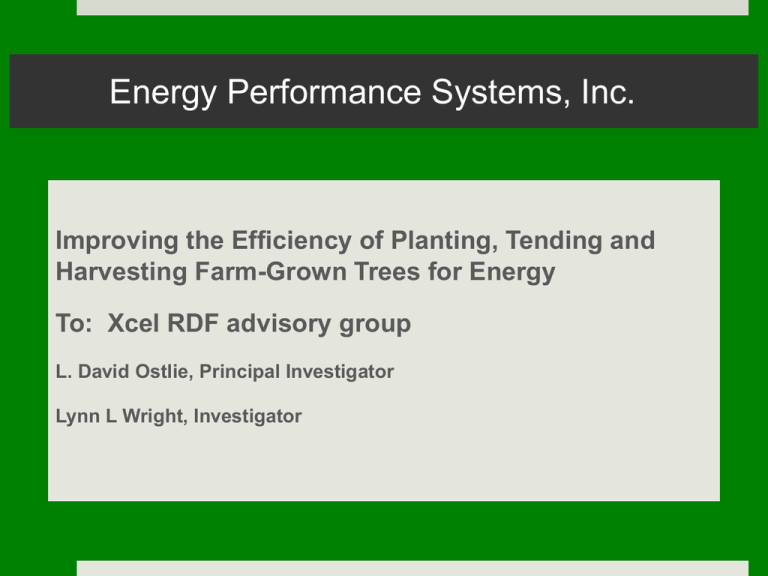
Energy Performance Systems, Inc. Improving the Efficiency of Planting, Tending and Harvesting Farm-Grown Trees for Energy To: Xcel RDF advisory group L. David Ostlie, Principal Investigator Lynn L Wright, Investigator Value Based Research Goals Values Lower the cost of electric power generation using renewable wood fuel; enough to cover the added risk in using new, modelone technology Establish a large scale (90 acre) tree farm demonstration using short growth cycle wood (5 years) to maximize fuel production while significantly reducing cost Fabricate and demonstrate a new high speed tree planter based on EPS’s proprietary design to advance tree production to levels like those using existing agricultural practices using a GPS guided tractor and trigger system Fabricate and demonstrate a new high speed tree harvester based on EPS’s proprietary design to efficiently cut and load trees on a trailer at a fraction of the cost of existing logging operations 2 EPS Injection Planter Planter in Operation at the Graceville Site Planter Summary Multi-row planter was built Planter was used under operational conditions Test demonstrated potential of machine injection; tree survival and growth was similar to hand planted sections of field Slip injection springs & materials have been redesigned Planting Cost Proved to Feasable at .03¢ or less 4 EPS Whole Tree Harvester™ Harvester after 160 Mile Transport to site Power Systems Being re-installed and Tested at Nearby Farm Site 5 EPS Whole Tree Harvester™ Harvesting Head: Continuously travels and cuts up to 9 feet per second without stopping while self sharpening blades and cuts up to a 30” diameter tree EPS Whole Tree Harvester™ Harvester Cutting Second Row of Trees 7 Project Participants Project Demonstration Participants 8 Project Participants Project Demonstration Participants Resting After Doubling as Camera Personnel 9 Harvester Summary 900 HP 65 Ton, 4 Tracked Unit Contiuously Harvested Trees at Speeds up to 8 FPS (6 MPH) Can Harvest up to 30” Trees Lifted Trees 13 Feet to Load Semi Trailers Cleanly Cut Trees within 2 Inches of the Ground Proved Self Centering Cutting Head to be Effective Traveled with Low Ground Pressure of 12 PSI Four Tracked Steering Proved to be Effective 10 Harvester Demonstration CEO Feeling Downsized after a Particularly Difficult Day 11 Hybrid Poplar Glencoe Tree Farm Project Investigator Lynn Wright Showing First Year Growth of NM-6 Hybrid Poplar on 80 Acre Site Hybrid Poplar Yield Results 40 Acre Tree Farm Near Graceville, MN Section of Farm Yielding 4 Dry Tons per Acre Per Year in 6 Years Planting Cost Analysis Required Factors Estimated Costs Six general laborers $8/hr, 600 hrs each season = $28,800 One skilled, trained, and certified operator $50/hr, 500 hrs each season = $25,000 Fuel $12,000 Miscellaneous (i.e. maintenance, tires, etc.) $13,000 Estimated Annual Operating Cost $78,800 Machine Cost $90,000 Cost per Slip the First Year $.03 Cost per Slip After Initial Investment $.01 14 Wood Production Cost Analyses Land Rent One Harvest, 6-year, EPS Costs $660.00 Two Coppice Harvest, 12-yearEPS Costs $1,320.00 One Harvest, 12 year NRRI assumptions $1,320.00 Harvest Yield (dry tons/acre) 24.78 49.56 48 NPV of all costs $924.22 $1,470.76 $1,549 Discounted Breakeven Price per ton $49.08 $43.60 $53.73 Discounted Production costs/dry ton $37.30 $29.67 $32.30 Harvesting Cost per ton $10.00 $10.00 $25 Farm-gate Price per ton $47.30 $39.67 $57.27 Cost Type 15 Benefit to the Rate Payer A new system was developed to lower the cost of renewable energy including new methods and new equipment If the legislature mandates increased attention to climate change caused by greenhouse gas emissions, this project provides a pathway to help satisfy the mandate without a significant increase in rate-payer impacts. Wood fired power plants can reduce the cost to the ratepayer by the new systme and by eliminating some of the indirect subsidies by using existing corn acerages 16 Where Do We Go From Here? Our Research indicates an all-in power plant delivered fuel cost of 3.65/Mbtu The increased fuel cost would be similar to natural gas in some regions Establishing a fuel plantation takes 6 years, 3 years before and 3 years after plant startup By Reducing the cost of harvesting, planting and tending this fuel crop coupled with building a new wood fueled power plant becomes technically and economically feasible If companies in Minnesota were to invest in or manufacture this home-grown technology, it could provide more incomes and jobs in Minnesota that would benefit ratepayers. 17 Electric Power From Trees Now is the Time for Closed Loop, Wood fueled, Electric Power Production EPS wishes to thank the RDF advisory Group, the Minnesota Public Utilities Commision including the rate payers and Xcel Energy in making our project possible. Project funding provided in part by customers of Xcel Energy through a grant from the Renewable Development Fund 18

